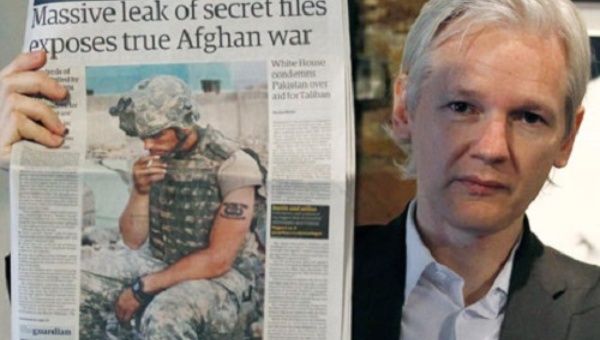
On the morning of 23 October 2010, WikiLeaks co-founder – Julian Assange – shared a London press conference stage with Iraq Body Count staff, and numerous other experts. Together, they defended WikiLeaks’ decision to release the Iraq War Logs, more than 400,000 secret U.S. army field reports.
Among the field reports was a video of a U.S. helicopter gunship involved in a notorious Baghdad incident, it showed U.S. combatants gleefully killing individuals after they tried to surrender. Assange highlighted that the disclosed logs documented 109,000 deaths in Iraq since the U.S. led invasion of the country in 2003. The total casualties of the illegal, oil hunger induced, war included 66,000 civilians, of which 15,000 were previously undocumented.
Following the release of the Iraq War Logs, the then UN Special Rapporteur on Torture, Manfred Nowak, said there was now a duty on the U.S. to investigate whether its officials were involved in or complicit in torture in Iraq.
Rather than respond to these calls for accountability, U.S. Vice President Joe Biden labelled Assange a “cyber-terrorist”.
Days later, the Iraq War Log revelations were overshadowed by news that Julian Assange was wanted in Sweden, to face questioning in relation to two allegations of “rape”. Despite the media frenzy, Assange has never been charged of anything. He is wanted for questioning by the Scandinavian country in relation to two sexual misconduct allegations.
In August 2010, Stockholm Chief Prosecutor, Eva Finne had cancelled an early arrest warrant saying there is “no suspicion” that Assange had committed “any crime whatsoever”. One of the women has since tweeted “I have not been raped” and alleged that the police have pushed through the investigation against Assange.
However, Prosecutor Marianna Ny re-opened the matter and issued a European Arrest Warrant and an Interpol “red alert” for Assange.
Since 2010, Assange has been waiting to hear whether he will be questioned, and charged in relation to the misconduct allegations. Prosecutor Ny refuses to travel to London to question Assange, even though Swedish law allows for it and the UK government has said it would actively facilitate it.
Swedish police have traveled to other countries to interview suspects in the past, including Germany, Serbia, the U.S., and even the UK. Assange has made at least four formal offers to the prosecution to interview him in person, in writing, via telephone, or via videoconferencing.
Swedish authorities have also never explained why they will not provide Assange a guarantee that they will not extradite him to the U.S.
There are real risks that Sweden may transfer Assange to the U.S. On 23 December 2014, Google finally informed WikiLeaks that it was cooperating with the U.S. Justice Department in a criminal investigation against WikiLeaks, which the department first launched in 2010.
Prosecutors are also withholding data in relation to the case from Assange’s lawyers.
Katrin Axelsson and Lisa Longstaff of Women Against Rape wrote: “The allegations against [Assange] are a smokescreen behind which a number of governments are trying to clamp down on WikiLeaks for having audaciously revealed to the public their secret planning of wars and occupations with their attendant rape, murder and destruction…”
For an example of how the U.S. treats whistle-blowers, one can look to U.S. soldier Chelsea Manning. Manning is currently serving 35 years in military prison for leaking information to WikiLeaks. Manning has been kept in “extreme” and “excessive” solitary confinement, violating her right not to be subject to torture and cruel inhuman or degrading treatment or punishment. If transferred to the U.S., Assange can expect similar treatment.
In light of these concerns, Assange took refuge in the Ecuadorean Embassy in London in June 2012. He sought asylum in Ecuador, and that country granted him refugee status. However, the UK refuses to grant him safe passage out of London, so he can travel to Ecuador. Instead it has spent more than £9 million to guard the Ecuadorean Embassy. This is more than what the UK has spent on investigating its own complicity in human rights abuses in Iraq.
On Monday 26 January 2015, Sweden’s human rights record was reviewed by UN Human Rights Council members. Ecuador asked Sweden to explain how it justifies long periods of pre-charge detention, and withholding potentially crucial evidence to individuals it is investigating. There are concerns that Assange’s health is deteriorating, while kept cooped up in a small room in the Ecuadorean Embassy.
There is no excuse for the Swedish authorities not to undertake their investigation – either by travelling to the UK, or by video-conferencing. Their failure to do so, has impeded Assange’s freedoms significantly. Ecuador’s questioning at the UN Human Rights Council, seeks to put pressure on States such as Sweden: States that contend to uphold the rule of law, while limiting the rights of those that dare shed light on what took place in the shadows of the war on terror.